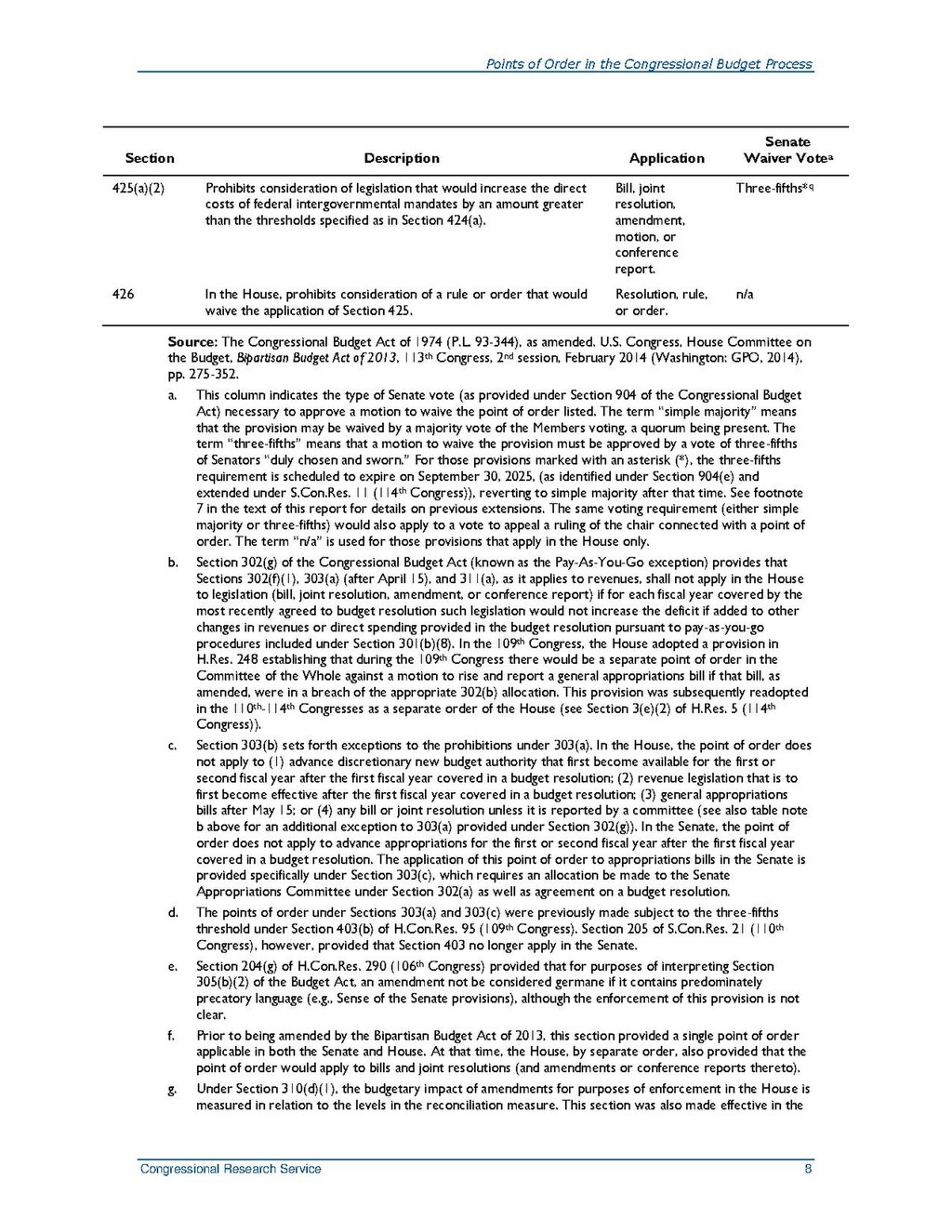Points of Order in the Congressional Budget Process
| Section | Description | Application | Senate Waiver Votea |
|
| |||
| 425(a)(2) | Prohibits consideration of legislation that would increase the direct costs of federal intergovernmental mandates by an amount greater than the thresholds specified as in Section 424(a). | Bill, joint resolution, amendment, motion, or conference report. | Three-fifths*q |
| 426 | In the House, prohibits consideration of a rule or order that would waive the application of Section 425. | Resolution, rule, or order. | n/a |
Source: The Congressional Budget Act of 1974 (P.L. 93-344), as amended. U.S. Congress, House Committee on the Budget, Bipartisan Budget Act of 2013, 113th Congress, 2nd session, February 2014 (Washington: GPO, 2014), pp. 275-352.
| a. | This column indicates the type of Senate vote (as provided under Section 904 of the Congressional Budget Act) necessary to approve a motion to waive the point of order listed. The term “simple majority” means that the provision may be waived by a majority vote of the Members voting, a quorum being present. The term “three-fifths” means that a motion to waive the provision must be approved by a vote of three-fifths of Senators “duly chosen and sworn.” For those provisions marked with an asterisk (*), the three-fifths requirement is scheduled to expire on September 30, 2025, (as identified under Section 904(e) and extended under S.Con.Res. 11 (114th Congress)), reverting to simple majority after that time. See footnote 7 in the text of this report for details on previous extensions. The same voting requirement (either simple majority or three-fifths) would also apply to a vote to appeal a ruling of the chair connected with a point of order. The term “n/a” is used for those provisions that apply in the House only. |
| b. | Section 302(g) of the Congressional Budget Act (known as the Pay-As-You-Go exception) provides that Sections 302(f)(1), 303(a) (after April 15), and 311(a), as it applies to revenues, shall not apply in the House to legislation (bill, joint resolution, amendment, or conference report) if for each fiscal year covered by the most recently agreed to budget resolution such legislation would not increase the deficit if added to other changes in revenues or direct spending provided in the budget resolution pursuant to pay-as-you-go procedures included under Section 301(b)(8). In the 109th Congress, the House adopted a provision in H.Res. 248 establishing that during the 109th Congress there would be a separate point of order in the Committee of the Whole against a motion to rise and report a general appropriations bill if that bill, as amended, were in a breach of the appropriate 302(b) allocation. This provision was subsequently readopted in the 110th-114th Congresses as a separate order of the House (see Section 3(e)(2) of H.Res. 5 (114th Congress)). |
| c. | Section 303(b) sets forth exceptions to the prohibitions under 303(a). In the House, the point of order does not apply to (1) advance discretionary new budget authority that first become available for the first or second fiscal year after the first fiscal year covered in a budget resolution; (2) revenue legislation that is to first become effective after the first fiscal year covered in a budget resolution; (3) general appropriations bills after May 15; or (4) any bill or joint resolution unless it is reported by a committee (see also table note b above for an additional exception to 303(a) provided under Section 302(g)). In the Senate, the point of order does not apply to advance appropriations for the first or second fiscal year after the first fiscal year covered in a budget resolution. The application of this point of order to appropriations bills in the Senate is provided specifically under Section 303(c), which requires an allocation be made to the Senate Appropriations Committee under Section 302(a) as well as agreement on a budget resolution. |
| d. | The points of order under Sections 303(a) and 303(c) were previously made subject to the three-fifths threshold under Section 403(b) of H.Con.Res. 95 (109th Congress). Section 205 of S.Con.Res. 21 (110th Congress), however, provided that Section 403 no longer apply in the Senate. |
| e. | Section 204(g) of H.Con.Res. 290 (106th Congress) provided that for purposes of interpreting Section 305(b)(2) of the Budget Act, an amendment not be considered germane if it contains predominately precatory language (e.g., Sense of the Senate provisions), although the enforcement of this provision is not clear. |
| f. | Prior to being amended by the Bipartisan Budget Act of 2013, this section provided a single point of order applicable in both the Senate and House. At that time, the House, by separate order, also provided that the point of order would apply to bills and joint resolutions (and amendments or conference reports thereto). |
| g. | Under Section 310(d)(1), the budgetary impact of amendments for purposes of enforcement in the House is measured in relation to the levels in the reconciliation measure. This section was also made effective in the |
Congressional Research Service
8
